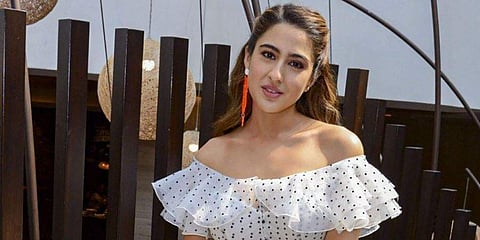I no longer depend on validation: Sara Ali Khan
You played the uber-rich Bambi in Murder Mubarak, followed by the feisty freedom fighter, Usha Mehta, in Ae Watan Mere Watan. While starkly different, both characters seek to express themselves. Is that something you resonate with?
It’s interesting to look at it that way. To achieve her dreams, Usha Mehta realises that there needs to be strength in her convictions. What I loved about the character is that her ideologies don’t mirror her father’s. Neither is she doing it because of the positive peer pressure. She simply stands firm in her beliefs, which almost juxtaposes with Bambi, who is such a product of her environment that her sense of self and identity is a reflection of that.
Usha Mehta was the founder of the Congress Radio and is one of the unsung heroes of the National movement. It was also your first time playing a real-life character. What was the prep like?
Kannan Iyer, the director, was sure that he didn’t want this to be a biopic, but a story inspired by Usha Mehta, and we have taken a decent amount of creative liberty. So it wasn’t really a biography-versus-inspirational-story challenge for me, at least. But telling a story inspired by true events that you believe had the potential of inspiring the youth is challenging in itself. Usha Mehta found her wings and was in charge of her flight, and that resonates at every level.
I think it’s the kind of lesson that transcends time. It’s not just about the freedom struggle or 1942. It’s relevant even today. We should not be searching for validation. We have to find our voice and wings. That signifies liberation.
Even as you talk about feeling liberated, do you sometimes feel burdened by the fact that perceptions of you as a person may come in the way of you as an actor?
I think that it’s not so much about perception as much as it’s the way I perceive myself. For instance, I felt that people started seeing me as an actor after Atrangi Re.That gave me a lot of confidence. That feeling was further cemented by the love I got for Zara Hatkey, and now Murder Mubarak. These things make you feel more and more confident. I have been lucky that people have had that belief in me as an actor. It is difficult to inculcate that by yourself. I have also reached a stage where I want love, appreciation and validation; those things are normal to want, but my sense of self has now stopped depending on it. It happened initially, but not any more.
Your mother, Amrita Singh, has been a strong influence in shaping you as a person. Do you turn to her for professional advice?
Always. She has shaped me entirely as a person and who I am today. But, it is important to honour your gut and instinct, which is what she tells me. The other thing she has told me is that it is important to work with filmmakers that will have their eyes on me—who will make me feel excited about my work, and help me grow, learn and unlearn on the way. Ae Watan Mere Watan made me feel free and liberated to do what I wanted.
Your brother, Ibrahim, is all set to make his film debut. Any words of advice?
Embrace the journey that will have its highs and lows. Everybody has their journey, it’s to live the experience.
What’s the one change you want to see change going forward for female actors in Bollywood?
What I hope is to do my job well. I want to tell hard-hitting stories, work and grow with filmmakers and do eclectic and contrasting genres of cinema. But, it is for me to work hard on myself.

